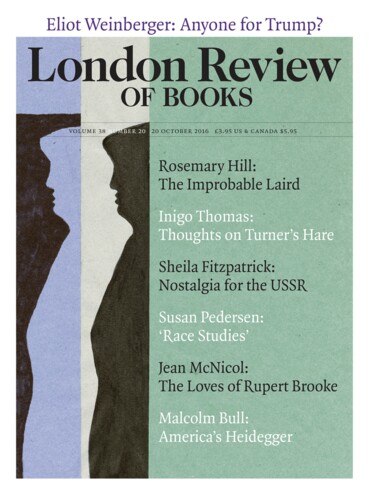The IRA bomb that went off in the Grand Hotel, Brighton in the early hours of 12 October 1984 blew half the building to bits, killed five Tory high-ups, including an MP, and seriously injured 34 others. The security forces really should have sniffed it out before Margaret Thatcher and most of her Cabinet moved in. It had been set up, with a timer, several days in advance. As an assassination attempt directed against Thatcher, however, it failed, having been placed in the wrong room. ‘The cry went up: “Maggie’s safe!”’ Jonathan Aitken remembered afterwards. ‘Such was the relief that strangers shook hands, and clasped each other’s shoulders.’ (How ‘British’! No hugging or kissing!) It also failed as an act of terrorism. Terrorism is supposed to terrify. The Brighton bomb didn’t. If anything, it had the opposite effect.
Bernard Porter
Bernard Porter’s recent books include Imperial Britain: What the Empire Wasn’t and Empire Ways. He lives in Stockholm.
The Commons vote on Tuesday night to give the Tories majorities on all the committees that are supposed to scrutinise legislation, including Brexit legislation, despite their not having a majority of seats in the Commons, has been described by the shadow leader of the house as a ‘power grab’. It’s also deeply unconstitutional. Britain is a parliamentary democracy, which expresses and enacts the ‘will of the people’, but only once that will has been scrutinised, debated and tested over a (fairly short) period of time. The idea that the ‘will of the people’ as expressed on a single day in June 2016 should be set in stone, never to be amended, runs against the principles and practice of parliamentary democracy.
Donald Trump’s reference to Sweden at his rally in Florida on 18 February had Stockholmers mildly amused at first. 'We've got to keep our country safe … You look at what's happening in Germany, you look at what's happening last night in Sweden. Sweden, who would believe this? Sweden! They took in large numbers. They're having problems like they never thought possible. You look at what's happening in Brussels. You look at what's happening all over the world. Take a look at Nice. Take a look at Paris.' He didn’t explicitly say that Sweden was experiencing Islamic terrorism, but that was clearly implied. His reference to ‘last night’ was precise. Swedish journalists tried to find the incident he might have been referring to, but could come up with nothing more exciting than snow-blocked roads in the north, a car chase in Stockholm and a randy elk. No Islamicists were involved. It transpired that Trump had been misled by an item on Fox News – where else? – which had tried to link rising crime in Sweden with its generous asylum policy; but even that turned out to have been a distortion.
Michael Fallon, the defence secretary, plans to institute military cadet corps in schools. The idea, apparently, is not only to provide future recruits for the British army, but also to instil discipline and ‘British values’ – whatever he thinks they may be – in young people. School cadet corps started up in the later 19th century in order to encourage national and imperial patriotism. Most public schools had them; state schools refused to, out of anti-militaristic principle. (That was one reason Baden-Powell founded his Boy Scout movement.) As far as I know, the public schools have them still. So do, or did, the grammar schools that liked to ape the public schools, such as mine.
Send more blondes: Spies in the Congo
Bernard Porter, 20 October 2016
No one asked the Congolese whether the Americans could take over their treasure to make the most terrifying and destructive weapon the world had seen, and then feed the American appetite for hegemony. They weren’t told of the Congolese component of the Hiroshima bomb until 17 years later. Then they got mad. ‘Bang! What a shock,’ Albert Makelele wrote. ‘A Belgian … stole Congo uranium … which went into a bomb.’
Pieces about Bernard Porter in the LRB
Lumpers v. Splitters: How to Build an Empire
Ferdinand Mount, 31 March 2016
‘Those who make many species are the “splitters” and those who make few are the “lumpers”,’ Charles Darwin wrote in 1857 to his friend, the great botanist...
Read anywhere with the London Review of Books app, available now from the App Store for Apple devices, Google Play for Android devices and Amazon for your Kindle Fire.
Sign up to our newsletter
For highlights from the latest issue, our archive and the blog, as well as news, events and exclusive promotions.


